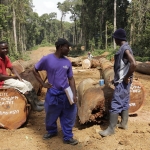Canada: Giant Food Chain Rejects Chemical Pesticides
TORONTO, Ontario, Canada -- Canada's largest food distributor has made a public commitment to stop marketing chemical pesticides by next spring. Loblaw Companies Limited announced today that it will no longer sell chemical pesticides in all of its 440 garden centers across Canada by 2003.
"In response to overwhelming consumer demand to eliminate the cosmetic use of pesticides in home gardens, Loblaw Companies Limited has decided to discontinue the sale of chemical pesticides in our garden centres, starting with the spring season 2003," said Loblaw spokesperson Geoff Wilson.
The company timed its announcement to coincide with tomorrow's opening of the annual Canada Blooms Flower and Garden Show at the Metro Toronto Convention Centre. Loblaw is the nonprofit event's presenting sponsor.
"We will use this venue to launch our commitment to Chemical Pesticide Free by 2003 and to further educate gardeners on how they can enjoy a chemical pesticide free garden," Wilson said.
Chemical pesticides are used to control algae in swimming pools, weeds and insects in the lawn and garden, fleas on pets, ants and roaches in the house, flies and mosquitoes, wood rot, rodents, and moth damage to clothes.
Environment Canada says that although homeowners use only five to 10 percent of all pesticides sold in Canada, they tend to use them inappropriately more often than commercial or agricultural users. Homeowners must be constantly aware they are dealing with hazardous chemicals and try to reduce pesticide use to a minimum, the agency advises.
Pesticides have been linked to a wide range of human health hazards, ranging from short term impacts such as headaches and nausea to chronic impacts like cancer, reproductive harm, and endocrine disruption.
Pesticides can cause many types of cancer in humans, and persistent health effects may occur years after even minimal exposure to pesticides in the environment.
Many pesticides have been shown to damage to wild species, the Sierra Club of Canada warns. The group cites carbofuran which was banned for most uses in the late 1990s, as responsible for the near extinction of the burrowing owl.
"Evidence indicates that even the family dog is a victim of pesticides. Dogs from homes with lawns that have been sprayed with pesticides have a higher than average rate of the canine equivalent of lymphoma. Cancer is now the number one cause of death in dogs," the Sierra Club says.
Loblaw Companies' garden centers have carried some organic based gardening products in the past. Last year, the company approached its suppliers to develop more organic based gardening products to replace their chemical pesticides.
"By the spring of 2003, we will have organic alternatives for virtually all of the chemical pesticides that we currently carry," Wilson said.
For this current season, the company will offer more organic based pesticides and gardening alternatives while transitioning out of chemical pesticides. Staff will provide educational handouts and information to consumers on how they can reduce their dependency on chemical pesticides.
Last year the Supreme Court of Canada established the right of municipalities to forbid the use of chemical pesticides on public and private property. On June 28, 2001, the Supreme Court upheld the town of Hudson, Quebec's bylaw 207, which bans pesticide use on public and private property for aesthetic purposes. The bylaw had been challenged in the Quebec courts and then at the Supreme Court by lawn pesticide companies after they were charged with violating the ban.
Loblaws will attempt to persuade consumers that with the use of organic alternatives to chemical pesticides they can still have beautiful lawns and gardens.
- 181 Food and Agriculture
- 195 Chemicals



